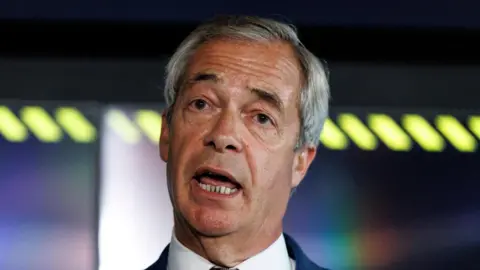Nigel Farage urges PM to appoint Reform peers to House of Lords
21 minutes agoIain WatsonPolitical correspondentJames ChaterBBC News

 EPA
EPAReform UK leader Nigel Farage has called on the prime minister to allow him to appoint peers to the House of Lords.
In a letter to Sir Keir Starmer, Farage said he wanted “the democratic disparity” in the upper chamber to be addressed, suggesting it was unfair that parties with fewer MPs were represented.
Reform has four MPs in the House of Commons and controls 10 councils in England, but currently has no peers.
Political appointments to the Lords are made at the discretion of the prime minister.
The prime minister is under no constitutional obligation to elevate members of opposition parties, but will often ask opposition leaders to nominate individuals for peerage.
A Downing Street spokesperson said: “The process for appointments to the House of Lords follows established conventions and is guided by advice from the House of Lords Appointments Commission and other relevant bodies.
“While political parties may make representations regarding peerage nominations, decisions are made in line with long-standing procedures.”
Asked about Farage’s letter, Defence Secretary John Healey told LBC “the same Nigel Farage that called for the abolition of the House of Lords” now wanted to fill it with “his cronies”.
The House of Lords is a part of Parliament. It scrutinises the work of government and is independent from the House of Commons, where MPs sit.
Members of the Lords are called peers. Like MPs, they scrutinise the work of government and recommend changes to proposed legislation. There are currently more than 800.
Once in the House of Lords, peers can change their political affiliation.
For example, Lord Pearson of Rannoch sat as a Conservative peer from 1990 to 2004, but switched to the UK Independence Party.
In his letter, Farage said: “My party received over 4.1 million votes at the general election in July 2024. We have since won a large number of seats in local government, led the national opinion polls for many months and won the only by-election of this Parliament.”
Farage added that he was in favour of reforming the Lords, but that “the time has come to address the democratic disparity that exists in the upper house”.
He noted that the Green Party, Plaid Cymru and Ulster Unionist Party (UUP) have 13 peers between them.
He also pointed out that the Liberal Democrats have 76 peers, despite winning fewer votes than Reform at the previous election. The Lib Dems currently hold 72 seats in the Commons, making them the third largest party after Labour and the Conservatives.
“None of this holds water any longer given the seismic shifts that have taken place in British politics,” Farage said.
Farage said his request to appoint peers was “modest”, but did not outline who he would nominate if given the opportunity to do so.
In May, Reform made sweeping gains in local elections, as well as winning the Runcorn and Helsby by-election by just six votes.
That success led Farage to claim that Reform UK was now the main opposition party.
In December, Sir Keir appointed 30 new Labour peers, including his former chief of staff Sue Gray. The Conservatives appointed six new peers, while the Liberal Democrats appointed two.
Last year, MPs backed plans to get rid of hereditary peers from the House of Lords.


Sign up for our Politics Essential newsletter to keep up with the inner workings of Westminster and beyond.